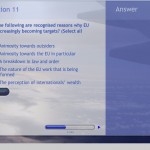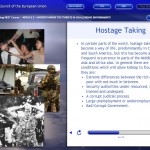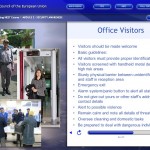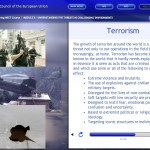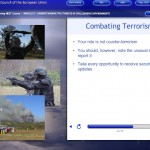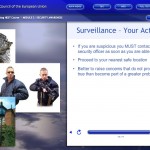A few days ago I got my certificate for Hostile Environment Awareness Training (HEAT) from the Carabinieri in Livorno. The Carabinieri are the Italian counterpart of the Gendarmerie, or Guardia Civil – the police force that depends from the Ministry of Defense. The training was given by the First Paratrooper Regiment (“Tuscania”), who engage in difficult operations abroad, like protecting VIPs in enemy territory or liberating hostages. They are strong, self-confident, good-looking and easy-going Italians, the real stuff, machos beyond posturing.
What is HEAT? It’s a new branch of activities in the burgeoning security industry. Hostile Environment Awareness Training emerged a bit more than a decade ago, in the giddy days of the War on Terror, as a service provided by ex-military to journalists and other people traveling to dangerous areas of the world. It was an easy sell, to call the BBC and ask them: don’t you care about the journalists you’re sending to Afghanistan and Iraq? Shouldn’t they know how to operate in a hostile environment? As these were also the days of embedded journalism – and the military appreciate to have ‘visitors’ who know about their operating procedures – this new service quickly grew, and it took only a few years for the EU to catch on, and by now a HEAT training is mandatory for any deployment to dangerous areas for the EU, the UN and many other international agencies.
The training was fun: five days being instructed by hard-core paratroopers, getting kidnapped, driving four-wheel drives through ponds, being taken under fire with close protection teams, dealing with enemy checkpoints and hostile locals, learning about mines and Improvised Explosive Devices (IEDs), applying battlefield first aid and learning how to sort war victims according to the degree of gravity of their wounds and possibility to keep them alive …

Training snapshot: the man is the middle plays a EU delegate about to meet a tribal chief. He will be taken under fire in a few instants and rescued by his close protection team (the Carabinieri)
But it is also deeply disturbing that civilian experts working for international organizations must undergo such a military training. There’s something truly wrong with why the EU wants us to do this, and with the whole industry behind it. Let me go through some of the reasons.
Hostile Environment
It starts with the term ‘Hostile Environment’. Neither Afghanistan, nor Iraq, nor Yemen, nor any of the other dangerous areas I have lived and worked in struck me as ‘hostile’. Tricky yes, dangerous too, sometimes; but if they had been hostile I wouldn’t have stayed. Afghans, Iraqis and Yemenis are gentle people, they are welcoming – if you don’t misbehave – and interested in building good relations with those who visit or work in their country. See for example this post of mine.
If you see an environment as hostile, and behave accordingly: well, then the environment becomes hostile to you. I saw it time and time again; first the US soldiers driving through Kabul and Afghanistan with their turret-mounted machine guns pointed at the local population; then all the security perimeters erected by international organizations around their premises or living quarters, keeping away hostile locals, often with the opposite effect – as evidenced by the Taverna du Liban bombing about which I recently wrote; finally, as a result of these measures, the paranoia evidenced by internationals at any attempt of locals to engage them in conversation or build a relationship.
You Never Know…
This was stressed time and time again during the HEAT training: don’t trust your driver, don’t trust your translator, don’t trust any local. Not because they are intrinsically bad (if they were, we civilians wouldn’t go to their countries) but because you never know: their family may have been kidnapped the night before and the ‘terrorists’ demand you in exchange for their release; they may have conflicting tribal loyalties; they may have serious financial troubles and been offered a great reward to betray you…
Well, I have I never personally encountered such a case in my years in the field. I know of many drivers and translators who mislead their international employers, and they may even steal from them. But certainly such extreme cases of betrayal are at least potentially possible. To the same degree that it is possible that your local baker decides to kill you because of your skin color, or that the barmaid you’ve flirted with follows you home to blackmail you with your family, or that your taxi-driver decides to rape and kill you instead of bringing you to your destination. Yes, ‘shit happens’ – everywhere.
The HEAT training course focuses only on this ‘shit happens’. Personally, the military police know better, because they’ve been in the field. They know ‘shit happens’ only very rarely, and always in an unexpected manner. But the EU requests and pays them to provide a training based on the ‘hostility’ of the local situation, so that’s what they do. Just about all the locals in their scenarios are dangerous, ready to kill you at all times. At one ‘irregular’ checkpoint drill I was dragged out of the car and shot by angry tribesmen because my driver refused to stop on time. All my exhortations to stay calm and talk, negotiate and offer help, which I know from experience would work to defuse the situation, were to no avail. When I remarked that my killing over such a minor incident was completely implausible, they replied with ‘you never know’.
The EU are basically training their personnel to become completely paranoid. You can see it in the online e-HEST ‘security training’ (consisting of more than 300 video slides with many tests in between) that one must complete before qualifying for the HEAT course.
The training stresses that as somebody from Europe you’re targeted in every hostile environment because people hate Westerners or Western values, because they behave irrationally, because of religious differences, because we make much more money than they do, because we have better access to power, etc. One of the slides shows a poor EU-staff member, identified by his vest with the EU logo, on his knees with a bag pulled over his head, while a terrorist points his gun at him, ready to shoot.
Your worst nightmare
During the training I spent several hours with a bag on my head. We were kidnapped. While driving through the forest in what was supposed to be Yemen, a group of gunmen appeared out of the blue, stopped our bus, and proceeded unload us all. They did that screaming, with brutality, and extreme precision. They put a bag over our head, forced us to lie on the ground with limbs spread, then carried us onto a truck, drove for 15 minutes – hitting us whenever we made an unauthorized movement or attempted to speak. Upon disembarking they made us queue up, holding each other’s shoulders, to walk through a patch of the forest into a tent. For two hours we were forced to stand or sit in very uncomfortable positions with our hoods on and listen to loud and horrible industrial sounds. Whenever one of us moved a bit to try to get into a more comfortable position or to peek out from under the hood, we would get screamed at and shoved back into position. In the meanwhile we were being pulled out one by one to be interrogated in a nearby tent. A spotlight shone in our face and a crazy masked ‘extremist’ jumped around putting a knife or machete to our neck, begging his boss permission to kill us whenever our answers didn’t please him or struck him as untruthful.
To me it was clear that this could not be a kidnapping in Yemen or any other country I know; this was 60% Guantanamo Bay mixed in with 20% Mexican drug cartels and 20% depraved Nazis. It was Hollywood, not Yemen.
It’s culture, stupid!
Now we get into the heart of the issue, which is a cultural one: all our ideas about Muslim terrorists and African child soldiers and other ‘hostile locals’ are shaped by our media industry, not by reality. It’s not only the movies about these kind of people and situations which shape our nightmares, it’s also the movies about gangsters, post-apocalyptic punk killers and deranged serial killers. In our minds we operate an amalgam between all these dark figures to create various stereotypes of the nemesis of the West, and our further fantasies of how these figures operate and what kind of ordeals they would like to put us through are filled in by our own dark drives.
Sure enough, the reporting media will be able to find examples of such dark forces in reality, and they focus on them because it is rewarding: we like to see the confirmation of our deepest fears and rather pay to read an article on the bestialities of our opponents than one highlighting their reasonable, humane nature. The one Iraqi group that beheads its victims with a saber in front of the camera will thus become paradigmatic, as will the suicide bomber that randomly targets peaceful citizens on a bus or in a market. Incidentally, there is a strong incentive for insurgent groups to behave like this, because it will ensure them a lot of media coverage.
One could maybe speak of a fear industry (which has always existed, but has gotten much better at its job through ICT) and a security industry, which is deftly feeding into the fear industry. We create this image of our nemesis, we ensure it becomes pervasive, then the EU – the bulwark of the civilized West – takes measures to protect us against it; such a realistic training as HEAT, together with the sober-sounding analysis of Eurocrats, definitely makes the threat sound more real. And it really works. Not on me, I’m beyond this kind of brainwashing, but all other course participants definitely became more paranoid during the training.
The Sane Are Excommunicated
The final result is that the EU (and the UN, and all other international organizations) is now making paranoia mandatory for all the personnel its deploying to dangerous ‘hostile’ environments. If you want to go against this paranoia you expose yourself to EU (or UN etc…) excommunication. Either you are a ‘starry eyed do-gooder’ or else, as in my case, you have ‘forgotten who you are’ – i.e. a target – because of a too long deployment, giving you a false sense of security (note that in ‘hostile environments’ any sense of security is false). In both cases you are dangerous not only to yourself but to the mission in general, because you imperil it.
By the twisted logic which is now current, the policy to put the whole mission on lock-down or evacuate it when something happens to one of its members is now used against you, because through your irresponsible actions you make it impossible for the mission to achieve its objectives, which is of course to help the poor and needy citizens of the host country. And to do that we must take full measures to protect ourselves against them.
One issue that this approach cannot resolve is the contradiction between seeing the population as helpless victims needing EU assistance and as hostile terrorists who hate the West. Of course, the easy solution is to say that the population is basically sweet, but that it is spoiled by extremist elements. However, when it comes to drawing a line between both groups, things get complicated. Think of the drones that target peasant wedding parties seeing them as terrorist congregations. Making this distinction is now the main headache of Western interventionists, from drone remote controllers in Nevada to EU security officers in the field. In the past, the humanistic impulse sometimes prevailed, but now that has completely changed; we don’t take any risk, and practically nobody from those countries we identify as hostile can enter our countries, or even the compounds we occupy in their countries.
In the last training exercise, one of the elements of the mission was to contact a group of Internally Displaced People (supposedly citizens fleeing a civil war) and establish a safe corridor for them to a refugee camp location. In my planning I had thought of buying tea, soft drinks, chocolates and biscuits for them, in case they were needy or upset and needed to be placated. We were even prepared to offer light medical assistance. But the actors the Carabinieri had fielded, all masked, came out of the woods to beat our cars with sticks, steal our belongings and shout Arabic-sounding things at us. I tried to reason with them from inside the car, until it was clear our safety was going to be compromised, then we took off and left them there, throwing pebbles at our departing vehicles.
As I wrote on this website, a month ago I was in a refugee camp on the outskirts of Kabul, occupied by Pashtuns purportedly evicted from their areas by NATO bombings. If any population should be hostile to people like me, tall blond Westerners arriving unannounced and unaccompanied in their slum, it would have been them. But they weren’t, and I’ve never anywhere met IDPs like those portrayed by the Carabinieri. But for the course participants these are probably the first refugees they have ever met … how will they react when they find some real refugees in the field? Roll up the windows, lock the doors, speed away and report the security incident? That’s what their training suggests them to do.
The effect on the effectiveness, planning and budget of EU and other international civilian missions in the rest of the world – because now everywhere is becoming ‘unsafe’ – is disastrous. ‘Hostile environment’ paranoia is making any meaningful, long-term engagement practically impossible. I’m deeply concerned, because the EU and the UN are the main institutions that could address many of the problems that beset this world. But I also see that it will require enormous events to change the fearful mentality which drives the industry.
In short: our security industry is actively making the world less safe.

